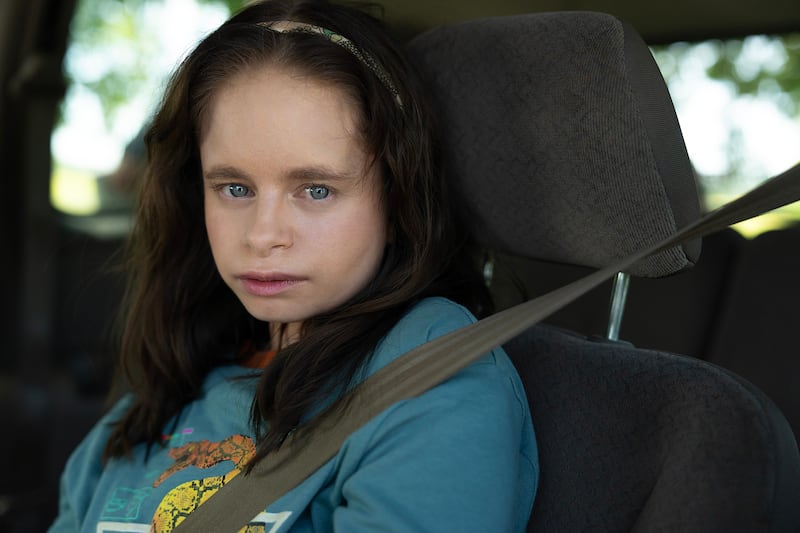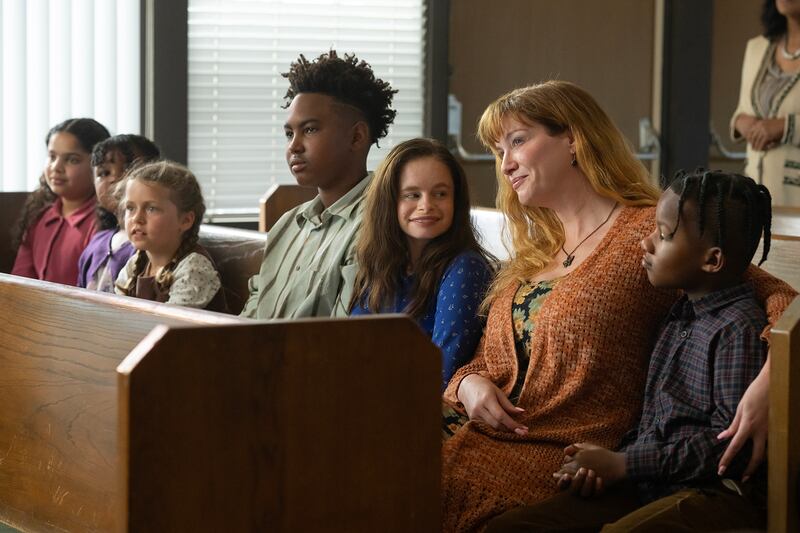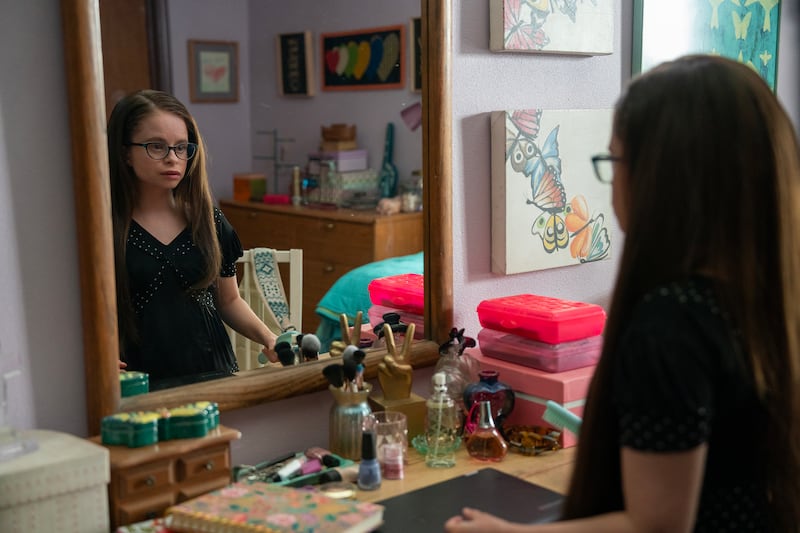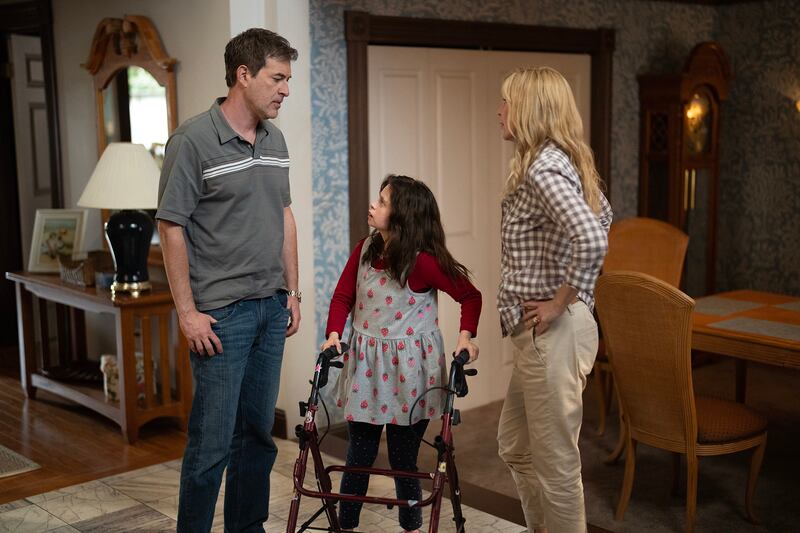“At first, I didn’t know what was true and what wasn’t.”
Actress Imogen Faith Reid admits this when discussing the story of Natalia Grace, the character she plays in Hulu’s Good American Family, which just aired its series finale.
Based on the real story of Kristine and Michael Barnett (Ellen Pompeo and Mark Duplass) adopting Natalia, a child with dwarfism, it morphed into one of the strangest, most disturbing true stories in recent memory.
In what became a huge tabloid scandal, Natalia was accused of lying about her age, pretending to be a child. Kristine was convinced that Natalia was trying to scam her family out of money so she could have surgeries. The Barnetts successfully petitioned to have Natalia’s legal age changed from 8 to 22, moving her into an apartment to live on her own. The Barnetts were later charged with neglecting a dependent, which the finale of Good American Family focuses on.

As one can imagine given all of that, Natalia Grace was an enormous role to take on. The character, at different times, has to feel like the very genesis of evil, a helpless young girl, a manipulative con artist, and a young adult woman yearning for justice. That’s especially daunting when you consider that Natalia is Reid’s first-ever speaking role—and the level of trauma that she portrays in the finale episode.
Though the story of Natalia Grace was a media sensation stateside, in Reid’s native United Kingdom, the story gained minimal traction. In an interview with The Daily Beast’s Obsessed, Reid said she’d never heard of Natalia Grace before the series. In her research, she only found a single discussion of the story in UK media. But Reid was struck by the sheer volume of representation of the ordeal in America.
Being a little person, there has been limited acting opportunities for Reid. “I truly never thought that I would be in a position to play a role like this,” Reid said. She didn’t speak to the real Natalia to prepare for this role. “I knew early on that I wanted to do my own version of Natalia. I wanted to show the empowerment and justice that I think her voice deserves on the show.” Reid hopes that if Natalia does watch, “she sees the passion that I put into my version of her.”
Before Good American Family, Reid primarily worked as a body double and stand-in. But when creator Katie Robbins saw Reid’s audition tape, she knew she’d found her Natalia. “It was like those old stories you hear of people wandering into Schwab’s in Los Angeles and just saying ‘Oh my god, you’re going to be a star.’ It was that kind of thing,” Robbins said.

“She was very childlike, and suddenly, there would be these little moments where just behind her eyes, you’d think, ‘Is there something more to this person and what is she capable of?’” Robbins continued. “That she could do all that in a self-tape was really something.”
When we first meet Natalia Grace in Good American Family, it’s 2010, and Natalia is seven. We see her through the perspective of her adoptive mother, Kristine. While Natalia is initially sweet and angelic, the mask soon slips, revealing a monstrosity hellbent on tearing Kristine’s family apart. She wields a knife over Kristine as she sleeps, sprays bleach in her coffee, and more.
Kristine becomes convinced that Natalia is secretly an adult trying to con her family. To prepare for these scenes, Reid took inspiration from a surprising source. “I really loved Angelina Jolie in Girl, Interrupted, and I think some of Natalia’s more devilish moments are channeling her,” she said.
One of Reid’s biggest acting challenges came in Episode 5 of Good American Family, when the perspective shifts from the Barnetts to Natalia. After successfully petitioning for Natalia’s legal age to be changed, the Barnetts move her to an apartment where she lives on her own. When we finally see things through Natalia’s perspective, the revelation is shocking. Suddenly, this demonic adult conning an innocent family is who she actually is: a young, helpless child.

“A lot of the shift was showing the pain Natalia went through,” Reid said. “It was so challenging, because from Kristine’s perspective, Natalia is quick. She’s always one step ahead. She’s manipulative. She knows everything before you do. And you need to know when to switch.”
Episode 5 shows Natalia’s day-to-day life, abandoned and left to fend for herself. “She can’t wash her hair, can’t do all sorts of things because she has dwarfism, but mostly because she’s an eight-year-old child. What eight-year-old can look after themselves?” Reid said.
The finale of Good American Family is set in 2022. Natalia is now an adult and living with the Mans family. The episode focuses on the court case that lays bare the unthinkable abuse Natalia endured by the Barnett family. That includes the discovery of tens of thousands of Facebook messages between Kristine and Michael, which discuss Natalia in shocking, humiliating ways. While the show is a fictional account of the real Barnett family and Natalia Grace, specific details, like the messages, are entirely real.
In the episode, Natalia reacts to the messages by saying, “It’s the way a lot of people talk about people like me.”
That was a painful moment for Reid to act out. “I’ve heard a lot of that language used towards me,” she said.. It’s often teenagers saying things behind my back as I’m walking somewhere. If you ask any little person, we do have that same shared experience of people being ignorant and talking about us like we aren’t there, or saying something out loud and thinking that we won’t hear it. But we do, and it’s just something that we have to carry.”

The courtroom scene features the most shocking moment in the entire series: Because of a legal loophole, any mention of Natalia’s age is forbidden. This effectively destroys Natalia’s case, as none of the witnesses called to the stand can properly testify about the abuse she faced as a child.
“Natalia’s identity is basically stolen from her,” Reid said. “It’s taken. She can’t say who she is. She doesn’t even know who she is now. That scene in particular is one that made me think, ‘I’ve really got to do this right. I’ve really got to do this justice.’”
When Natalia takes the stand, she is forced to lie about her birth year and has to say she was born in 1989, instead of the truth of 2003. It’s a moment that ensures she won’t win her case, and the abuse she faced will go unpunished. “The director Iain [B. MacDonald] said to me, ‘Imogen, you need to imagine hearing the worst news of your life. That advice really struck me, and I remember having genuine tears doing that scene. It was such a heartbreaking moment,” Reid said.
Despite a heavy and often devastating finale, Good American Family ends on a high note. After losing the court case, Natalia is convinced the world will view her as a monster. But when she gets home, her adopted siblings show Natalia social media reactions to a video of her. They’re extremely positive and full of kindness—she may not have won the case, but she has won the court of public opinion. “I think we did get justice in some way with Natalia receiving that love and support,” Reid said.

The last moment of the show is Natalia exhaling, a moment of peace she’s wanted for well over a decade. It’s a sense of resolution; the fears of how she’d be perceived dissolve away in one breath. “At first, it ended on a smile. We tried a version where I laugh and giggle, and eventually we settled on the exhale,” Reid said. “It was great to get that joy after so much heartbreak. It felt like a warm hug.”
Just as Natalia’s journey ends with hope, Reid wants Good American Family to lead the charge in changes in casting film and television. “I really hope this opens the door for other little people to be on screen,” Reid said. “For us, the more inclusivity, the better.”
The post Natalia Grace: The Adoption Story From Hell in ‘Good American Family’ appeared first on The Daily Beast.




